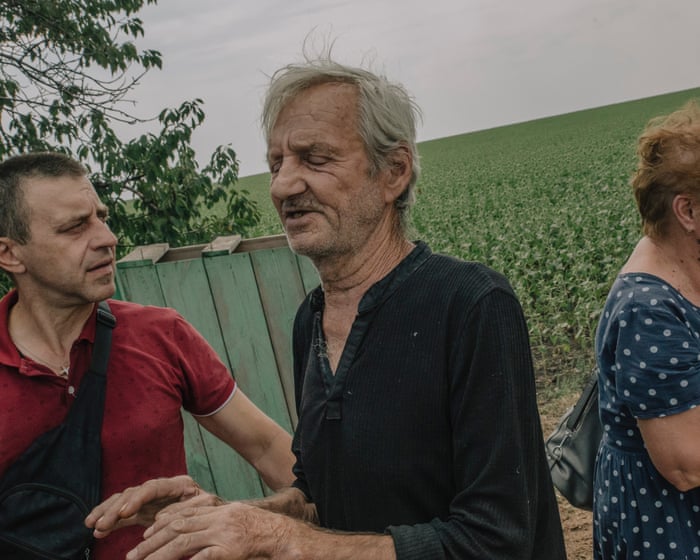One summer day, Ukrainian artist Stanislav Turina brought two books to his garden near Kyiv. One was a collection of poems by Alexander Pushkin.
But Turina, an avid reader who always carried books in his backpack, had no intention of reading it again. Since Russia’s full-scale invasion in 2022, Pushkin has taken on a troubling meaning in Ukraine. The invaders often use him as a symbol of Russian identity—for example, during the occupation of Kherson, huge posters of the writer were put up around the city.
For many Ukrainians, this shows how Pushkin is being used as a cultural weapon in Russia’s war. Some also argue that his poetry reinforced, or even helped shape, Russia’s imperial ideology. Since 2022, many of his statues have been taken down, and streets named after him—there were at least 594 in 2018—have been renamed.
Turina knew he couldn’t sell the book. “You couldn’t give it to a friend or donate it to a library,” he said. So in his garden, he carefully placed the Pushkin volume on a bonfire.
Burning Pushkin wasn’t an act of hate, he explained. It was a personal, experimental gesture by an artist. “I’m afraid to burn books—to me, it feels barbaric,” he said. His goal was different: he wanted to see how it would make him feel. Would there be catharsis? Grief? Anger?
“I didn’t feel anything. Not good, not bad,” he said.
The second book Turina held was a collection by contemporary Russian poet Dmitry Vodennikov. This one represented a very different connection.
As a student in Lviv in the early 2000s, Turina saw Vodennikov perform his work. It was a revelation. “It was something new—a fresh voice. I could tell he was gay from between the lines. It was tender. Very cool,” he recalled. “I became a fan.”
He told his parents he needed extra money for sports shoes, then spent more than half his monthly student stipend on a copy of Vodennikov’s poems. “In time, I knew all his poetry by heart,” Turina said. “He shaped my thinking and my artistic vision.”
But after 2022, Turina looked into Vodennikov’s stance on the war. “And now,” he said, “I find he’s a pro-war poet.” Turina decided to leave his former hero’s book in the garden to rot.
Across Ukraine, readers are grappling with what to do with their Russian-language books. Many, especially in creative and cultural circles, have switched to using Ukrainian in daily life. How to “decolonize” from centuries of Russian and Soviet cultural influence is a frequent topic of discussion.
In some cases, Russian missiles have made the decision for people. On the morning of June 23, after a barrage of drones and cruise missiles, Russian-language books—some apparently stained with blood—lay among the ruins of an apartment building in Kyiv’s Shevchenkivskyi district. Ten people, including an 11-year-old, were killed in the attack.
When writer and curator Kateryna Iakovlenko’s apartment in Irpin was hit directly in March 2022, all her books—including those in Russian, the language she grew up with—were destroyed, along with everything else she owned.
Three years later, she owns just two books in Russian, both translations not available in Ukrainian, and both gifts from the authors.
Oleksandr Mykhed faced…A similar experience happened to him when his house in Hostomel, near Kyiv, was hit during the first weeks of the full-scale invasion. In his book The Language of War, the writer—now a soldier—describes visiting the ruins and finding his Dostoevsky and Nabokov books among the wreckage. Losing his home changed how he feels about his possessions, including his books.
“Once you become a refugee, you always think like one,” he said. “It’s better not to get attached to books. They’re just extra weight you might have to deal with if you need to leave.” His new library contains no Russian-language books, not even translations of foreign works.
Oleksandr Mykhed, a Ukrainian writer and soldier, poses for a portrait at Kyiv’s Knyzhkovy Lev bookshop. (Photo: Julia Kochetova/The Guardian)
This June, freelance journalist Mariana Matveichuk took 90kg of Russian books to a recycling center near her hometown in western Ukraine. Though she grew up in a Ukrainian-speaking area and attended a Ukrainian-language university in Kyiv in the early 2000s, most people in the city—and many of her classmates—spoke Russian at the time. Many of the authors she studied, like French philosophers Gilles Deleuze and Jacques Rancière, were available in Russian translation but not Ukrainian.
She admits to having had “a book fetish” and often visited Kyiv’s sprawling secondhand book market at Pochaina. After graduating, she brought her collection back to western Ukraine by train. These are the books she has now recycled—except for Anton Chekhov’s letters and diaries. “I have personal respect for him. Chekhov is funny; I like his sense of humor,” she said. “And they’re hidden at my mum’s, so no one will see Russian books on my shelves.”
She thought about selling the books back to dealers at Pochaina but decided against it. “I thought no, I don’t want to give them a second life.”
People browse books at Kyiv’s Pochaina market. (Photo: Julia Kochetova/The Guardian)
Looking back, she reflected on how many academic texts she had read in Russian as a student, despite studying at a Ukrainian-language university. She called it a form of “subtle Russification” in the culture around her. Getting rid of her Russian books—including works by Tolstoy, Dostoevsky, and 12 volumes by Vladimir Mayakovsky—was also a way of “saying goodbye to some of my perceptions when I was 20. I am saying goodbye to what I thought was important.”
Opinions on what to do with Russian books vary widely among book lovers. Some keep them because they’re part of family history—perhaps reflecting parents’ or grandparents’ efforts to acquire them during Soviet times. Others have come to dislike the Russian language, associating it with the mindset and media of the invading country, but still hold on to a favorite book—like a treasured Russian translation of Haruki Murakami—because it represents a piece of their past.
In Kharkiv, a city that has been primarily Russian-speaking for decades, the art…Artist Pavlo Makov uses Ukrainian in his daily life, but he has no plans to part with his Russian books. He points out that many foreign-language works still lack quality Ukrainian translations, a sign of Russia’s historical dominance in the post-Soviet publishing world compared to Ukraine.
He questions the wisdom of destroying or recycling Russian books, warning that such actions can evoke memories of authoritarian regimes. “For Ukraine’s image, it’s not a good idea,” he says. “You may hate the Russian language—I get that—but a book is a source of information.” In fact, he believes studying Russian literature is important precisely because Russia is a close enemy: “We should examine it, we should research it.”
At Pochaina, Kyiv’s large secondhand book market, business is slow. It’s a place to find Russian books, but not necessarily to sell them. One bookseller, Dmytro Drobin, points to what he calls “an Egyptian pyramid” of unsellable books—mostly Russian-language Soviet editions, from Tolstoy to Stendhal.
Another bookseller, who preferred to remain unnamed, sells both Ukrainian and Russian books. She notes that language preference often depends on age: “Young people mostly want to read in Ukrainian.” When people offer her Russian books, she rarely buys them—demand has dropped.
She adds that few customers now ask for books published in Russia. Importing Russian books has been restricted since 2016 and banned outright since 2023.
Drobin, surrounded by thousands of Russian titles in his shop, feels the government is pushing “forced Ukrainianisation,” comparing it to Tsarist-era restrictions on Ukrainian publishing. While Ukrainian authors can still publish in Russian, they no longer qualify for state grants. Books by Russian citizens are banned. Ukrainian is the sole official language, though Russian remains widely spoken, alongside minority languages like Crimean Tatar.
Drobin blames the slow market on millions of Ukrainians leaving the country, many joining the army, and the economic strain of war. “The very nature of reading has collapsed,” he says.
In contrast, the mood is brighter at Alpaca, a family bookshop in a southern Kyiv suburb that specializes in children’s books. Far from the city’s trendy central stores, Alpaca offers a deal: bring in unwanted Russian books and get a 20–30% discount on new ones. The shop sells the Russian books for recycling and donates the proceeds to Ukraine’s armed forces.
Manager Maryna Medvedeva explains, “I wanted to give people a way to clear out old books they can’t give away or sell—it’s a shame to just have them lying around.” She and her colleagues have brought their own Russian books to contribute. “I’m not sorry. I thought about keeping some, but when I opened one, I just couldn’t read it—I felt repulsed.”Yulliia Kavun was at the store with her young son, Myron. Her family had to leave their home in Kostiantynivka, in eastern Donetsk, after Russian-backed forces took control of parts of the region in 2014. Most of their home library—filled with books in Russian, the language they spoke at home—was completely destroyed when their house was hit on February 26 of this year.
Now, Yulliia was considering using Alpaca’s program to help buy the books Myron needed for school.
For her, choosing books was just one more adjustment in her difficult life as a refugee. She planned to move to Poland, where her older daughter already lived—but that would mean switching languages and starting over with a new set of books.
“We’re nobody here, and we’ll be nobody there too,” she said. “So what’s the difference? We might as well go. Once we’re there, we’ll have to buy books in Polish.”
Frequently Asked Questions
Of course Here is a list of FAQs about the rejection of Russianlanguage books in Ukraine designed to be clear and conversational
General Beginner Questions
Q What is meant by rejecting Russianlanguage books
A It means many Ukrainians are actively choosing not to buy read or promote books published in the Russian language even if they understand it perfectly They are opting for books in Ukrainian or translations into Ukrainian instead
Q Why are Ukrainians doing this now
A Russias fullscale invasion in 2022 was a major turning point For many the Russian language became directly associated with the aggressor its propaganda and the violence Choosing Ukrainian is a powerful act of cultural and national selfdefense
Q Is this about banning a language
A Not exactly Its primarily a consumer and cultural choice not a government ban on speaking Russian Its about people consciously deciding to support their own language and culture as a form of resistance
Q Doesnt this limit access to great literature
A The goal isnt to lose access to global stories but to access them through a Ukrainian lens Theres a massive push to translate important world literature directly into Ukrainian bypassing Russianlanguage editions
Deeper Advanced Questions
Q What about Russianlanguage books by Ukrainian authors
A This is a complex area Many Ukrainian authors who once wrote in Russian have switched to Ukrainian Their older Russianlanguage works are now often viewed in the context of their overall identity as Ukrainian artists but new works are firmly in Ukrainian
Q How does this affect Ukrainian publishers and bookstores
A It has created a huge boom for the Ukrainian publishing industry Demand for Ukrainianlanguage books is at an alltime high Publishers are investing heavily in new translations and promoting local authors Bookstores have reshaped their inventories to reflect this new demand
Q Are all Russianlanguage books rejected equally
A No Modern books from Russia especially those published after 2014 are viewed most negatively as they may contain propaganda or imperialist narratives Sovietera books and classic literature are in a grayer area but the preference is still for Ukrainian translations
Q What is the deRussification of libraries
A Many public and school libraries are going through a process of removing books that



